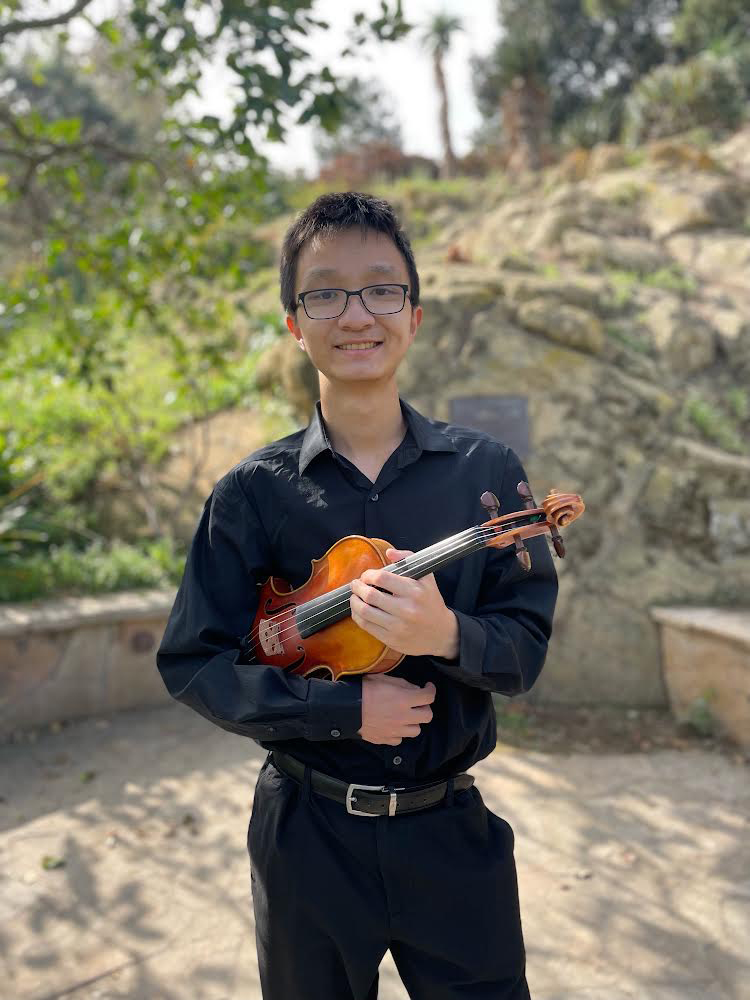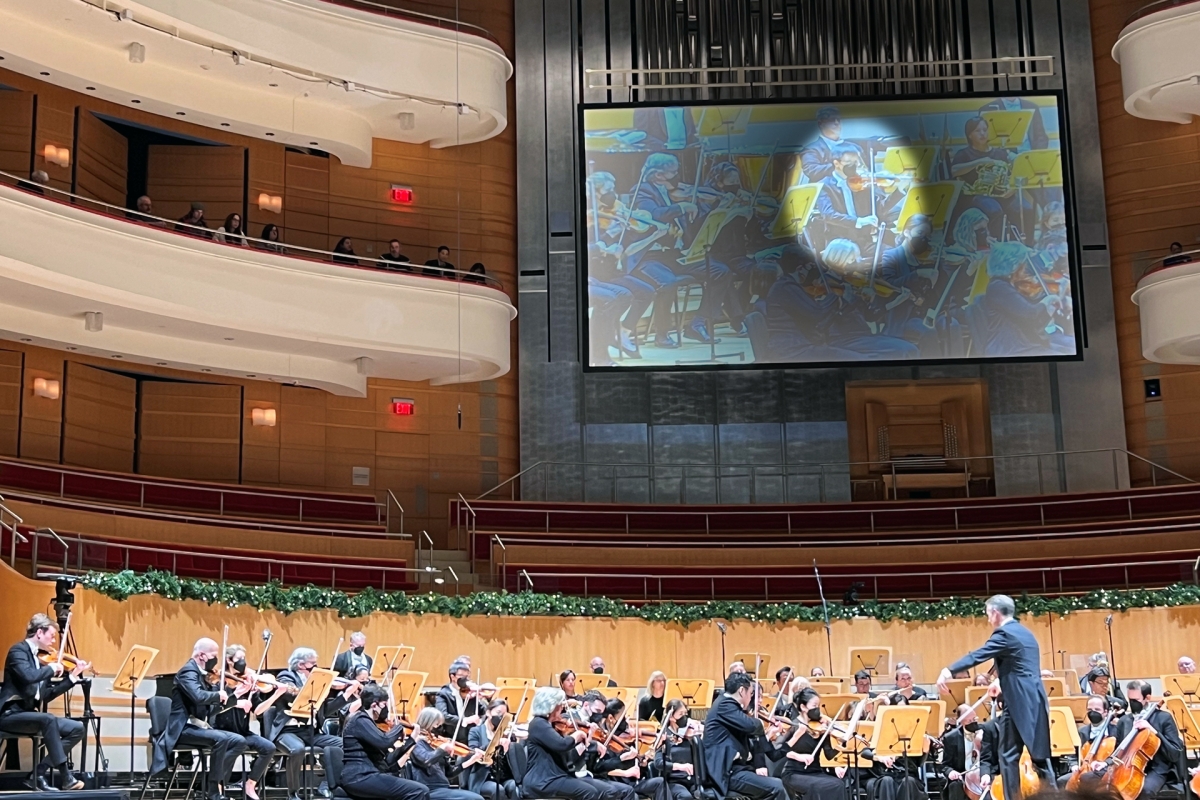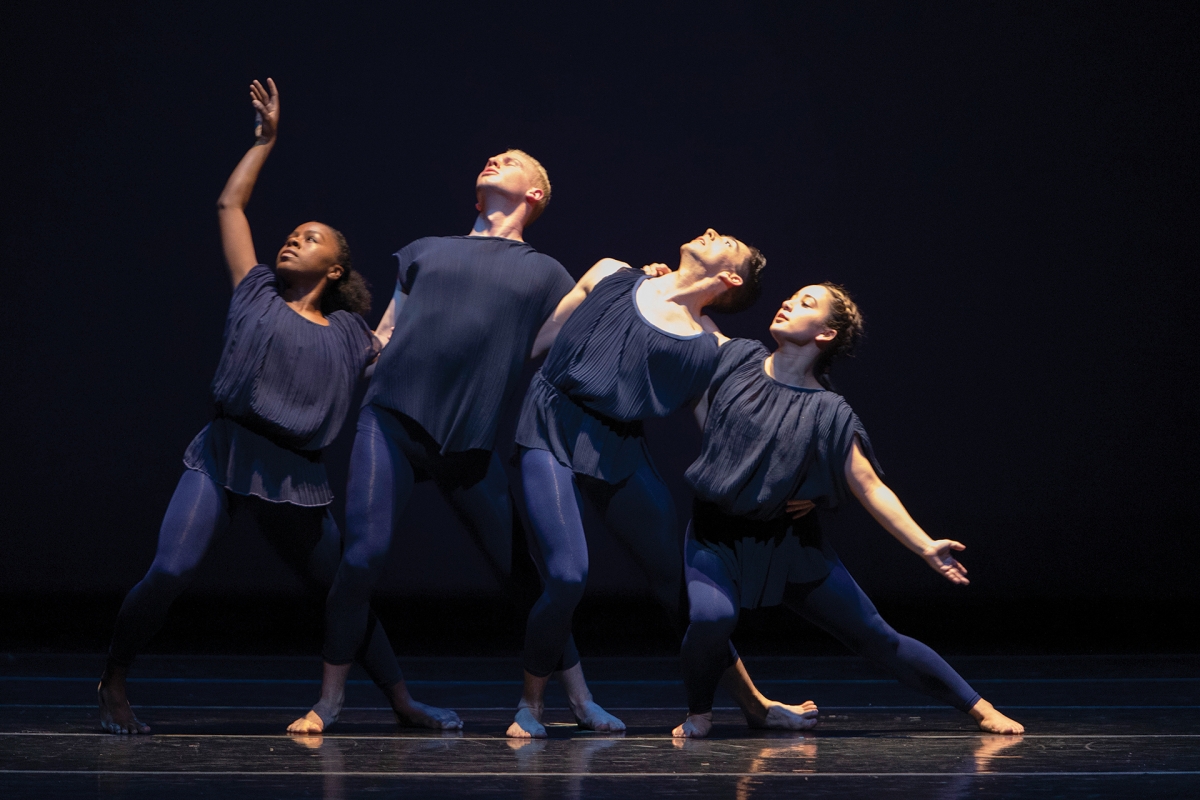Doubling Down
CTSA students embrace risk as they pursue careers in arts and other fields
By Christine Byrd
Living the artist’s life requires embracing risk. Unlike medicine or business, there is no clear-cut pathway to a successful and stable career in the arts. But in the quest to create art by taking risks again and again, student artists emerge more resilient, adaptable and prepared to thrive in any field they ultimately choose.
"The arts naturally cultivate risk-takers," says Tiffany Ana López, Dean of the Claire Trevor School of the Arts. "Artists are unafraid to experiment, disrupt norms, and introduce new ways of thinking and seeing. By design, we encourage and empower our arts students to expand pathways to impact their communities, not only for themselves but also for others."
One in four UCI arts students choose to double major, adding extra work to their already full course load — some to expand their opportunities and others simply to feed their insatiable intellectual curiosity. Pursuing an arts education at UCI offers the unique opportunity for students to also experience the academic breadth of a top-10 public research university and to leverage the benefits of both as they forge their own unique pathway into the future.
Finding Artistic Authenticity
Awni Abdi-Bahri ’17, known as Anita Abdinezhad when she was a student, will be popping up on streaming services this year, including on the HBO Max series Girls on the Bus and the fourth season of Evil on Paramount+. But she came to UCI planning to become a dentist like her mom.
After Awni immigrated to the U.S. at age 6 and took several years of English classes, her parents resorted to enrolling her in an acting class to help her gain more confidence in the language. Although she continued acting with South Coast Repertory throughout high school, it was always understood that she would choose a career in the sciences. But at some point during college, the vertigo she experienced toggling between Shakespeare and organic chemistry became too much.
"Acting was what I felt most excited and passionate about,” she says. “It both challenged me and aligned me to my personal call to action, which I soon discovered was to inspire empathy and change through story.”
She decided to double major in drama and public health with a minor in anthropology. While she was earning honors in acting, she took classes with graduate students and realized she craved that level of rigor in her own training. She set her sights on earning an M.F.A. and moving to New York City — about as far from safe, suburban Irvine as she could get.
Making good art requires risk. And, to me, in order to be risky one needs to authentically be themselves.
Although Awni won scholarships to several graduate programs, none of them were in NYC. Rather than settle, she took a gap year and performed in UCI’s New Swan Shakespeare Festival, moved to LA, auditioned for commercials, practiced improv, and put her public health degree to use working for Amnesty International. When she applied to M.F.A. programs the following year, she was accepted at Columbia University.
In her final year at Columbia, she landed standby roles for Rachel Dratch, Julianne Hough and Lilli Cooper in Broadway’s POTUS (or Behind Every Great Dumbass are Seven Women trying to Keep Him Alive). When the run ended, she acted in a number of workshops and development projects before filming recurring roles for Girls on the Bus and Evil. Although the industry is more competitive and less stable than a career in dentistry, Awni thrives in it.
“The only competition I have is with myself; my challenge is how can I be better at the next audition or project,” she says. “When people get nervous about other actors who are their ‘type’, it’s distracting. My focus is always on how I can get out of my own way to be more myself.”
Now, back in Los Angeles, she’s creating her own opportunities. In the fall, she will star in a full-length play that she wrote, called Three Tall Persian Women, which will be directed by fellow CTSA alum Dalia Ashurina ’17. This next level of creativity comes from embracing aspects of herself that she used to try to hide, such as being an immigrant, being Middle Eastern, learning to speak English, or even admitting that she wanted to be an artist.
“Making good art requires risk. And, to me, in order to be risky one needs to authentically be themselves. I really started understanding that at UCI,” she says. “Once I took the risk and plunged into the things that made me me, I felt the art and stories that I wanted to make started making themselves.”

Image: Awni in The Iliad at UCI in 2016. Photo: Paul R. Kennedy
Taking Calculated Risks
 Joseph Wong ’23 came to UCI to study computer science, but now he spends his days coding and his evenings and weekends performing with the Pacific Symphony.
Joseph Wong ’23 came to UCI to study computer science, but now he spends his days coding and his evenings and weekends performing with the Pacific Symphony.
Wong played violin since he was 5 years old, including competitively throughout high school in the Bay Area. When he first arrived at UCI, he auditioned for the Symphony Orchestra, but once he discovered it wouldn’t fit easily into his computer science course schedule, he decided to put away his bow for good.
That’s when he realized how much he missed music. He joined the orchestra the very next quarter and soon added violin performance as a second major. Dennis Kim, an assistant professor of violin performance and the concertmaster for the Pacific Symphony, saw Wong’s potential and encouraged him to stretch further.
“I learned a lot from Professor Kim about musicality and working with people,” says Wong. “He really pushed me from being a good amateur to being a professional now.”
At Kim’s suggestion, Wong spent the better part of a year practicing harder than ever before, preparing to audition for the Pacific Symphony. At the last minute, he got cold feet and nearly canceled his audition. But Kim called him and asked point blank, “What have you got to lose?”
“I realized he was right, there’s no reason not to take the audition,” Wong says. “If I hadn’t taken the risk, I wouldn’t be playing with the Pacific Symphony now.”
Wong made it through several rounds of auditions, the only undergraduate competing with many musicians who had master’s degrees. He earned a spot on the substitute list, which means although he is not on the regular roster, he is often invited to play in Pacific Symphony concerts. Over the last year, he’s performed with them dozens of times, including Mahler’s Symphony No. 9 and Verdi’s Rigoletto.
“Just playing in such a good group is a really exciting experience,” says Wong. “Plus Segerstrom Hall sounds amazing, and it’s incredible to think I’m part of making that sound.”
When he’s not playing violin professionally, Wong puts his computer science degree to use for Paramount, working on the platform that streamed Super Bowl LVIII online, and earning better money than a typical musician. He’s also enrolled in a master’s program in computer science at UCLA to further his career in that industry.
Juggling all of that is itself a risk, but Wong learned a lot about time management from his years double majoring at UCI.
“In general, I like to take calculated risks,” Wong says. “You’ll never win if you don’t take risks.”

Image: Joseph Wong performs with the Pacific Symphony Orchestra (highlighted on the screen). Photo: Goran Matijasevic
Moving in New Directions
 Jacob Boarnet ’20 triple majored at UCI, earning bachelor's degrees in both dance performance and dance choreography as well as in criminology, law and society — topped off with a minor in psychology and social behavior. Although he had danced his entire life and was a regular on the competition circuit, he always knew he would have more than one major. Boarnet turned down full rides to dance programs that did not encourage students to pursue other academic interests.
Jacob Boarnet ’20 triple majored at UCI, earning bachelor's degrees in both dance performance and dance choreography as well as in criminology, law and society — topped off with a minor in psychology and social behavior. Although he had danced his entire life and was a regular on the competition circuit, he always knew he would have more than one major. Boarnet turned down full rides to dance programs that did not encourage students to pursue other academic interests.
At CTSA, Boarnet performed in about 20 shows including Dance Visions and Dance Escape; he choreographed a piece for Physical Graffiti; and he joined the dance department's Community Student Advising Committee and the student-founded Bare Bones Dance Theater. He traveled with dance professor Lisa Naugle and other students to perform in Italy and participated in the inaugural Summer Dance Jerusalem, and even did a 4-week summer intensive at Hubbard Street Dance Chicago.
But through the process of declaring his multiple majors, Boarnet grew fascinated by the role students played in academic advisement. Soon, he became a peer academic advisor himself, working with staff and helping fellow undergraduates map out their course paths. As he approached his graduation, he decided not to pursue a professional dance career.
“I realized my favorite part of the day was when I was being a peer academic advisor and working with students,” he says. “The team I worked with really inspired me to my next path, which is where I’m at right now.”
Criminology, law and society gave me the skills, but my dance experience taught me what it truly means to be part of a community.
Now, with a Master in Education Administration, Boarnet works as an intake, outreach and care manager in the Office for Equity, Equal Opportunity, and Title IX at the University of Southern California, where he continues to support students every day. Dance still informs who he is and what he does, even as he applies for law school.
“I learned so much more from dance than the professional values like productivity, time management and respect. I learned empathy, kindness, unconditional love,” Boarnet says. “We started to subconsciously understand one another to the point that you are matching each other’s energy and moving as one.”
“I realize that's why I’m so interested in advocating for civil rights and working for change,” he adds. “Criminology, law and society gave me the skills, but my dance experience taught me what it truly means to be part of a community.”
Whether in a courtroom or on a stage, the lessons learned as an arts student at UCI will serve him for a lifetime.
“Not everyone who majors in the arts is going to become professional in that discipline, but they can take what they learned and apply that to another area,” Boarnet says. “That takes incredible risk, courage and vulnerability, too, which is what the dance department and CTSA taught me.”

Image: Jacob Boarnet (second from left) performs in Dance Visions 2020 at the Irvine Barclay Theatre. Photo: Rose Eichenbaum
Learn more about programs offered by the University of California, Irvine, at uci.edu.
Read more about Claire Trevor School of the Arts alumni at www.arts.uci.edu/news/alumni.
Please visit our secure direct giving page and make a gift to support CTSA today!

